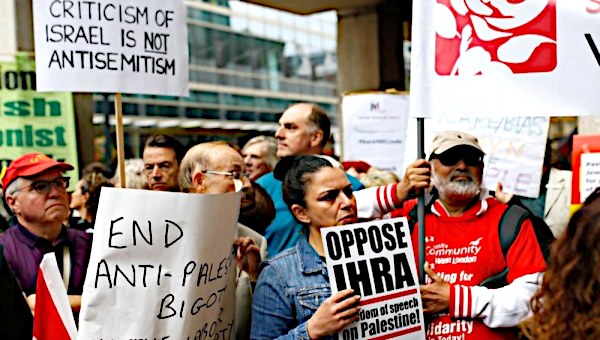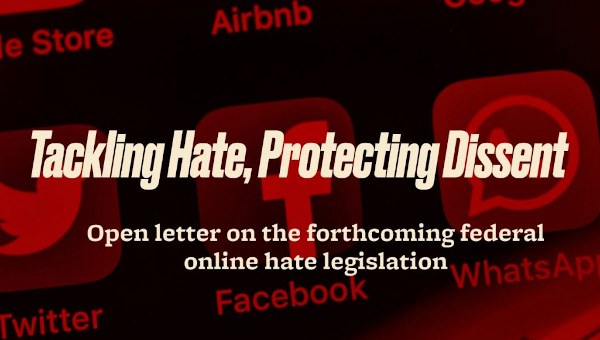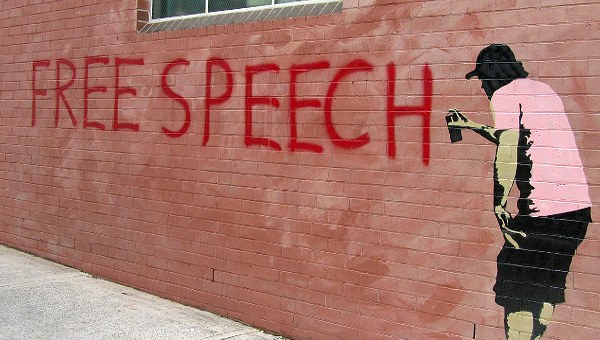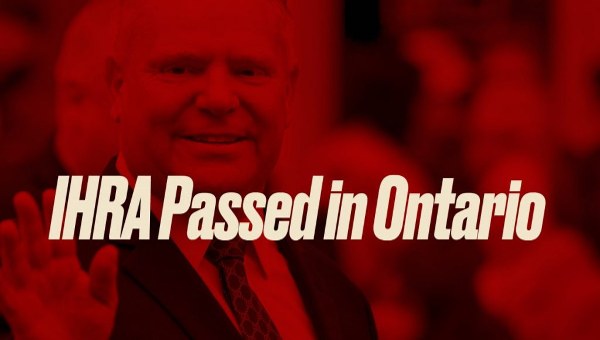What Really Happened at the Winnipeg Public Meeting Labeled Antisemitic?
Proponents of the Working Definition of Antisemitism championed by the International Holocaust Memorial Alliance (IHRA-WDA) insist that their definition is aspirational, not legally binding, and meant only to rally opposition to hatred of Jews. But the fallout of an event several years ago is emblematic of how highly dangerous the definition’s threat is to freedom of expression about Israel and Palestine.
On February 28, 2018, several Winnipeg organizations commemorated US President Donald Trump’s decision to move the US embassy to Jerusalem with a meeting at the University of Winnipeg entitled “My Jerusalem.” At the meeting, panelists from Jewish, Muslim, and Christian backgrounds reflected on their connections to the beleaguered city. All were critical of the Trump decision and of the Israeli regime.
But the pro-Israel group B’nai Brith Canada (BBC), working from a well-worn playbook, set to work to smear the event. Unable to shut down the meeting in advance or to force the organizers to accept one of its own speakers, BBC complained to the university that the meeting was held on a Jewish holiday and included antisemitic statements. B’nai Brith demanded an apology. This particular scheme in the playbook is called “throw mud and hope that something sticks.” In this case, the mud stuck.
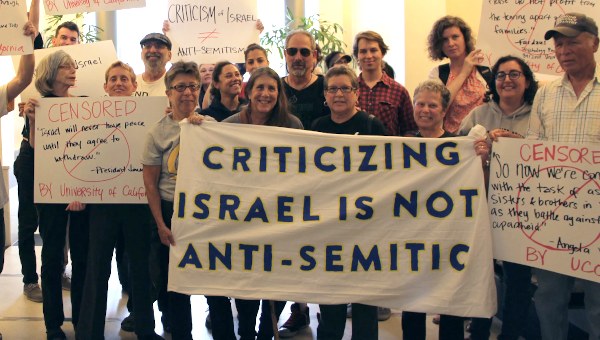
Applying the IHRA Definition
The university’s Human Rights and Equity officer investigated the complaints and stated, “For the purpose of the review analysis, the IHRA definition of anti‐Semitism was applied.” Using the IHRA definition as its guide, “the review determined that certain statements made at the event could be considered anti‐Semitic.” When asked by meeting sponsors precisely which statements in the meeting were antisemitic, the officer declined to answer.
The IHRA definition is now notorious. It contains eleven examples, seven of which involve criticism of the State of Israel. It has been roundly condemned as an exercise meant not to combat antisemitism, but to protect Israel from negative critique. It has recently been challenged by the Jerusalem Declaration on Antisemitism (JDA), signed by over 300 of the world’s top scholars of Jewish studies, antisemitism, and the Holocaust. The JDA debunks the idea that mere criticism of Israel can be antisemitic. But, as the saying goes, a lie can travel halfway around the world before the truth can get its boots on.
Armed with the IHRA-WDA, the University of Winnipeg ended up issuing a fulsome apology to the Winnipeg Jewish community and made several recommendations to appease the complainants, including tracking “reported or known incidents of anti-Semitism;” encouraging “events and other opportunities to educate [university community] members about the Holocaust, anti-Semitic stereotypes, and other topics of concern to the Jewish community;” and seeking “communication and partnerships with representatives of Jewish and other community organizations.”
Further Event on Israel/Palestine Frustrated
When the organizers of the maligned event attempted later that same year to organize a teach-in about Israel and Palestine, they ran up against a duly-chastened and uncooperative university and had to hold that event elsewhere.
The university’s response is a classic example of the nightmare scenario that critics of the IHRA-WDA have been warning about. Using the IHRA’s bizarre definition, even mild criticism of Israel is punished and sanctioned and discouraged, if not shut down.
B’nai Brith argues “[the IHRA-WDA] provides clarity on matters pertaining to the identification and confrontation of antisemitism.” Proponents of the IHRA challenge disparagers to show examples of its use to squash opinion. Well, the University of Winnipeg event shows precisely how the IHRA-WDA was always meant to be used.
It is useful to do a close reading of University of Winnipeg meeting, to explore exactly what was said. Was it really antisemitic? Readers who are interested can judge for themselves as a recording of the meeting is available. For those with less time, this essay will explore those questions.
Close attention to what was actually said at the meeting, as opposed to the B’nai Brith complaints, reveals an event so anodyne, so polite, so full of good will, that one wonders if the detractors were at the same meeting. If such a meeting falls afoul of the IHRA definition of antisemitism as the university administrators suggest, then we are in deep trouble and can kiss reasoned debate and academic freedom goodbye.
The Winnipeg meeting was sponsored by an impressive and diverse array of community organizations: Independent Jewish Voices – Winnipeg; Canadian Arab Association of Manitoba, Global College – University of Winnipeg; Mennonite Central Committee – Manitoba; Mennonite Church Manitoba Working Group on Palestine and Israel; Peace Alliance Winnipeg; United Church Conference of Manitoba and Northwestern Ontario; and United Jewish Peoples Order – Winnipeg.
The speakers were also diverse.
- Esther Epp-Tiessen, a long-time staff person with the Mennonite Central Committee, has served with MCC in the Philippines and various parts of Canada. Epp-Tiessen presented a chronology of the events leading up to the present-day.
- Rabbi David Mivasair has been involved with Israel/Palestine for nearly 50 years. He lived there for four years including his work for the Center for Jewish Non-Violence. He is an active member of Independent Jewish Voices Canada, and of the rabbinic council of the US-based Jewish Voices for Peace. He is the rabbi emeritus of the Ahavat Olam synagogue in Vancouver. Mivasair spoke of what Jerusalem means to him, a Jew.
- Idris Elbakri is a Palestinian Muslim Canadian, born and raised in Jerusalem. He moved to the US after high school in pursuit of higher education, and settled in Winnipeg with his wife and children in 2003 and has been involved in several community organizations. His parents and extended family still live in Jerusalem, and he visits there regularly.
- Fadi Ennab is a Palestinian Christian Canadian, born and raised in the Middle East. He teaches a course on migration at the University of Winnipeg. He trains service providers from across Manitoba, from an anti- oppression approach, on how to work with refugees. He also published a research report on refugee parents in Winnipeg schools. He holds an MA in sociology from the University of Manitoba, focusing on the history of police violence against indigenous peoples in the Canadian provinces.
What specific complaints did B’nai Brith make about the meeting?
B’nai Brith’s Complaints
B’nai Brith’s Aidan Fishman claimed that the meeting was held on a Jewish holiday and thereby precluded participation of Winnipeg Jews. Which holiday was that? The “holiday” was Purim, a largely non-religious celebration, unlike the “high holidays” of Rosh Hashanah or Passover. On Purim, as on Chanukah, Jews are not religiously enjoined from working or attending to business or going to political meetings. But presumably Fishman’s purpose was to exploit the lack of knowledge of Judaism among Gentiles to portray the event’s timing as a slap in the face to Jews.
Fishman also complained that the meeting should have chosen a different Jew than David Mivasair to speak. Fishman called Mivasair “a marginal figure from Vancouver with views well outside of the Jewish mainstream,” and protested that the university’s Global College should have “include[d] an authentic Jewish perspective.” Mivasair is an authentic Jew, a rabbi, no less. Granted, he is not an authentic apologist of Israel, as B’nai Brith defines authenticity. Moreover, last we looked there is no Jewish pope and no power by any Jewish organization to excommunicate fellow Jews.
As for an “authentic Jewish perspective,” the claim by B’nai Brith and the other Jewish establishment organizations that they alone represent Canadian Jews ignores the deep divisions within the Jewish community on the question of Israel and Palestine, as we will show below.
Fishman made only three specific allegations about the supposedly antisemitic content of the meeting (numbering added):
- “Ennab falsely accused Israel of committing a ‘genocide’ against Palestinians, while (2) Elbakri tarred indigenous Israeli Jews as ‘European settlers.’ He went on to suggest that (3) there is no space for a ‘Jewish ethnic enclave’ in the ‘Arab Middle East.’”
With regard to (1), Ennab said precisely the following:
“So, 1948 for my dad and his family, it wasn’t good. Whether you call it ethnic cleansing, or whether you call it colonialism, whether you call it, genocide, cultural, social, genocide… You don’t have to just kill the physical body. The Holocaust genocide experience [of the Jews] is really enlightening. The limitation is that people start thinking that when you say genocide, you just start thinking of bodies physically dying, but you can kill a whole whack of people through culture. It’s called kill the Indian in the child, but save the child. So, we’re kind of killing the Palestinian and saving their bodies.”
If using the word “genocide” is indeed hate speech, then the UN Convention on the Prevention and Punishment of the Crime of Genocide stands guilty. It defines five characteristics of genocide
- Killing members of the group;
- Causing serious bodily or mental harm to members of the group;
- Deliberately inflicting on the group conditions of life calculated to bring about its physical destruction in whole or in part;
- Imposing measures intended to prevent births within the group;
- Forcibly transferring children of the group to another group.
Likewise, cast the line further and reel in Canada’s Truth and Reconciliation Commission, which called the system of Indigenous residential schools, “cultural genocide.” A recent poll shows that over half of Canadians agree. It is well-accepted in human rights parlance that genocide is a broad term.
Settler Colonialists
With regard to complaint (2), Elbakri used the term “settlers” only twice. The first time he referred to European settlers in Canada.
“…we came into this tension about the different narratives around the foundation of modern Canada. We have the narrative of tenacious settlers and immigrants who are able to succeed against many odds, could have been the narrative of the indigenous peoples of Canada.”
The second time, he mentioned “settlers” as follows:
“…there are different narratives of land without people for people without a land, the narrative of the Jewish immigrants and settlers going there to make a desert bloom, and so on.”
With regard to complaint (3), Elbakri said that the moving of the embassy and the whole process of forcing or inducing Palestinians to leave is leading to an unfortunate outcome, and that people of good will should ask themselves:
“Do we want an ethnic enclave? What’s being called for is basically an ethnic enclave in the middle in the Arab Middle East for Jews only.”
These then, are the examples Fishman used to make accusations of antisemitism. Are these examples so horrendous that the meeting should not have been allowed to go forward, or that the university needed to apologize to the Jewish community, or that a freezing pall of silence on the subject of Israel should fall on the University of Winnipeg? Or were they, at worst, debatable? We will come back to that word presently.
Just to make sure we haven’t missed any other possible examples, scouring the transcript of the meeting for perhaps provocative words or phrases reveals the following:
- “Colonial,” or “colonized” was used ten times:
- In phrases like “European colonialism;” “colonial enterprise;” “European national colonialism;” “settler colonialism” in either Canada or Israel/Palestine; supporters of Israel may not like the terms, and may even argue they are not applicable, but they are not hateful.
- “Zionist” was used five times:
- Twice the panelist referred to “Zionist militias” (in the 1940s) attacking Palestinian neighbourhoods.
- One historical reference is to “the Zionist project of creating a Jewish homeland.”
- There are two references to the Christian “Evangelical Zionist narrative” in which the ingathering of the Jews to Israel is considered necessary for the second coming of Christ.
- The term “settlement” or “settlers” was employed about 25 times:
- Mostly in the terms “settler colony” or “settler colonial.”
- Several referred to Israeli Jewish settlements having increased in numbers after the Oslo Accords of 1993/95.
- There were a few references to “Settler violence” by Israeli Jewish residents of the West Bank on Palestinians.
- One use each of “Settler ideas,” and “settler mentality.”
- Fadi Ennab referred to himself, an immigrant, as a “settler” in Canada.
- “Ethnic cleansing” was used once:
- Elbakri was talking about what happened to his family in 1948: “Whether you call it ethnic cleansing, or whether you call it colonialism…”
- “Dispossession” (and variants) was used seven times:
- Mivasair said on his first trip to Israel he saw Palestinians being dispossessed of their homes.
- One panelist claimed “Dispossession has increased.”
- Another referred to the Palestinians as “Dispossessed people.”
- Ennab referred to his father’s dispossession.
- One speaker claimed that “One side [Israelis] dispossessed the other [Palestinians].”
- There was a claim that Canadian indigenous people are dispossessed.
- “Occupation,” or “occupier” was used 10-11 times:
- Israeli occupiers of Palestinian land – 2, 3 times
- The Occupation, meaning the Israeli occupation of Gaza, West Bank, and Golan Heights – 8 or 9 times; one says the occupation is unsustainable.
- “Boycott, divestment and sanctions” or BDS was mentioned precisely once, by Ennab, as a non-violent way to induce Israel to change its ways.
- The word “apartheid” was used three times:
- Once, referring to “the Apartheid Wall” (which the Israelis themselves call the “Hafrada” or separation) barrier, separation being the English equivalent of the Afrikaans word “apartheid,”
- Twice comparing the situation of Palestinians to that of blacks in South Africa prior to 1991
Using the “A” Word: Apartheid
As for the word “apartheid,” its use has become well-accepted, not only as an analogy, but also, as an accurate description of the situation in Israel/Palestine. Former US President Jimmy Carter used it as long ago as 2006 in his book Palestine: Peace Not Apartheid.
A recent report by the respected Israeli human rights organization B’Tselem concluded that Israel was practising apartheid from “the river to the sea.” In other words, not only in the occupied territories, but in Israel proper. Shortly afterward, the prominent international NGO Human Rights Watch, which has usually refrained from provocative language, also decided to use the term apartheid.
This, then, is the entire extent of terminology employed by the speakers that could possibly be discomfiting, unless the very notion of a meeting criticizing Israel, even mildly, is to be forbidden.
But the meeting also had some comforting messages for Jews and friends of Israel. Rabbi David Mivasair related that he has children living in Israel and talked about his affection for the country despite his criticisms of Israeli policy. Elbakri spoke of the First Intifada as “a time of hope…we had hoped that the Intifada would lead to two states with Jerusalem as the capital of Israel and Jerusalem as the capital of Palestine. It was a hopeless or historic compromise by giving up the dream of all of Palestine we at least save some bits of it or some remnants of it.” Ennab warned the audience “what killed the Jews [in the Holocaust] weren’t the bad people. It was good people, the banality of evil that Hannah Arendt wrote about. It was so widespread that it seemed that it was business as usual sometimes; that’s what we should be really careful about to stop normalizing oppression.”
As for the allegedly discomfiting words and phrases, we must ask “discomfiting to whom?” Given what we will see in the EKOS poll below, we cannot assume that it is discomfiting to all Canadian Jews, only to those who do not wish to see Israel accused of misdeeds.
Even if the phraseology were discomfiting to some, is it antisemitic? If one uses simple common sense, or any definition other than the IHRA’s, then these expressions describe facts or draw conclusions from facts. Or they are opinions based on historical facts. The use of the IHRA definition, however, magically transforms those same factual utterances into poison, dripping with hatred toward Jews, as the definition is designed to do.
But let us even assume that some of the remarks made at the meeting were not innocuous, but rather, actually hurtful to some supporters of Israel. Setting the question of the actions of the State of Israel and the Zionist movement aside for a moment, did any of the comments express hatred toward or disparagement of Jews as Jews? No, there was not one example of that in the entire meeting. None of the speakers engaged in toxic stereotypes of Jews or suggested that Jews in general are responsible or even answerable for Israel’s actions. That leaves the criticisms of Israeli policies and practices.
One of the tropes we often hear accompanying the IHRA definition is that only Jews themselves can tell us if something is antisemitic. The problem is which Jews? What gives B’nai Brith (or CIJA, or the Friends of the Simon Wiesenthal Centre, for that matter) the right to speak for Jews?
As mentioned earlier, Jewish communities have long been divided on the question of Zionism and Israel. Prominent Jewish intellectual icons, including Sigmund Freud, Albert Einstein, and Hannah Arendt, all rejected political Zionism. Israeli historian Tom Segev, in his biography of Israel’s first Prime Minister David Ben-Gurion, writes that “According to Paula [Ben Gurion’s future wife], her [American Jewish] family opposed her marriage [in 1917] to Ben-Gurion because he was a Zionist.”
Jews Strongly Divided on Israel/Palestine
And, despite 73 years of communal indoctrination since the founding of the State of Israel, Jews are divided still.
In an American 2020 survey, only half of Jews in the 18-29 age group “feel very/somewhat attached to Israel.” Indeed, only 58% of US Jews of all ages feel this attachment.
The recent (2021) attacks by Israelis upon Palestinians has further estranged American Jews from Israel.
A 2018 EKOS poll of Canadian Jews indicated, among other things, the following:
- 44% say Israel is not making sincere efforts at peace with the Palestinians;
- 37% have a negative opinion of the Israeli government;
- 30% think boycott, divestment, and sanctions against Israel are reasonable;
- 48% agree that “[a]ccusations of antisemitism are often used to silence legitimate criticisms of Israel.”
Proponents of the IHRA definition insist that they are not seeking to have contraveners criminalized. But with the concept of legal pluralism, legal scholars have long recognized that there is formal law, and informal law. Formal, or state law, explicitly sets out prohibitions on our actions. For example, it is against the law to cross the road on a red light or to physically harm another person outside of self-defence. If we contravene these prohibitions, we can expect sanctions to follow.
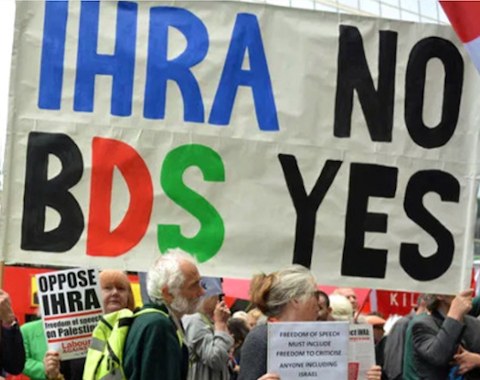
But our society is full of examples of informal law. Indeed, its power can be equal to or greater than that of formal law. Informal law consists of sets of rules and/or expectations formulated outside of the formal state law regime and for which contravention carries negative consequences (and for which compliance can carry positive consequences.) For example, in employment, management draws up a series of workplace rules. Violation of these rules can result in discipline up to and including dismissal, which can have very negative consequences for the suspects. Semi-autonomous groupings, like Indigenous communities, may have systems of dispute resolution that members are expected to use and where refusal to submit can result in communal exclusion.
Universities and schools have rules and norms of comportment that carry consequences. And this last is precisely what we saw at the University of Winnipeg.
The purpose and threat of the IHRA definition need not be its power to formally criminalize alleged transgressors or to impose state-initiated punishment or restraint upon them (although that has happened in some places, notably Europe.) It need only to be adopted into informal law to change the discourse so that rigorous critique of Israeli policies and practices is considered outside the pale, and thus, invites censure and withdrawal of privileges.
Independent Jewish Voices Canada has compiled a catalogue of instances from around the world of the IHRA definition being used to cancel events or silence Palestine solidarity movements.
Finally, and most importantly for a university, the worst that could be said about the comments made by the panelists at the “My Jerusalem” is that they are “debatable.” So where better than a university to have an ongoing debate? I hold an event to present my findings and my view. I may call the situation in Israel/Palestine “apartheid” and I can cite B’Tselem and Human Rights Watch to that effect. I may tell about how Jerusalem has affected my life.
If you disagree, you hold your event and say that I have been insensitive, or misguided, or even wrong. That’s debate. And debate doesn’t necessarily mean that you must be invited to my meeting or that I must be invited to yours.
When Canada’s Truth and Reconciliation Commission called the government’s policy of abducting Indigenous children to residential schools “cultural genocide,” many Canadians were offended. Many disagreed with the term. In response, The Globe and Mail, Canada’s national newspaper of record, published an editorial, that said, in part, the following:
“If you were taken aback on Tuesday, or even offended, when the long-awaited Final Report on the Truth and Reconciliation Commission of Canada accused your country of ‘cultural genocide,’ step back for a moment and try this exercise:
“Close your eyes and imagine you are at home with your two children, a boy aged six and a girl aged eight. There’s a knock at the door. It’s a moment you’ve dreaded for weeks. You answer it and there is a man from the government and an RCMP officer who order you to turn your children over to them immediately…
“…This country needs to be shaken out of its indifference. It needs to acknowledge a dark history that Canada authored. Canadians must consider how to remedy the harm that we – Canadians – caused.”
If I have uttered threats or fomented hatred or threatened violence toward an identifiable group, then there are criminal and human rights sanctions available to those affected. But if something is debatable, then debate it. Don’t you dare shut it down. •


